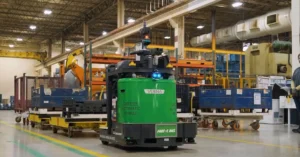What is Technology Doing to Supply Chain Management?
Supply chains have long operated by people performing repetitive tasks. As technology improves, supply chain management is increasingly performed by software, robotics, and other tech. According to Harvard Business Review, the trend clearly shows that technology is replacing people in supply chain management as well as increasing efficiency in the process.
Common Influences of Technology on Supply Chains
Some basic ways that technology has been influencing supply chain management in the last ten years include:
- The use of radio frequency identification (RFID) for inventory tracking
- Connection of purchasing options to social media
- Purchases through manufacturer websites instead of through middlemen
In more recent years, these uses of technology in the supply chain have evolved and expanded. Today, it is common for technology to play a vital role in:
- Supply chain analytics
- Digital manufacturing maintenance and planning
- Business process outsourcing
- Decision-making based on data, predictive analytics, and more
What Technology is Taking Over in the Supply Chain
As technology is incorporated into more aspects of supply chain management, companies are beginning to expect technology to take over logistics planning, data mining and research, inventory tracking, and analytics. For many companies, these improvements mean fewer jobs but more specialized careers. Software that can be customized to help supply chain management in small businesses is growing, indicating that this shift in employment need and investment will affect corporations large and small.
New Technology Affecting Supply Chain Management
Supply Chain Digital predicts that supply chain technology will continue to increase efficiency and replace old processes in coming years. Some emerging uses of technology in this industry include:
- Greater use of the cloud among manufacturers and supply chain managers
- More automation of supply chain functions between businesses and logistics providers
- Enhanced visibility of blockchain technology, improving safety, efficiency, tracking time, delivery processes, and more
The world’s leading research and advisory company, Gartner, suggests that businesses should test trends on small projects as these technologies continue to grow and impact significant aspects of supply chain management.








